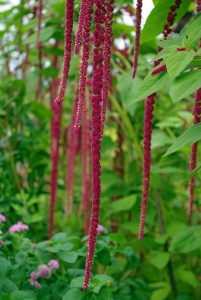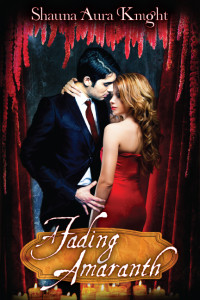Excerpt Poetry: A Fading Amaranth
 Here’s some poetic behind-the-scenes from my novel A Fading Amaranth.
Here’s some poetic behind-the-scenes from my novel A Fading Amaranth.
When I was working to find the right title for my story, I kept hearing the word “amaranth.” Almost like a whisper, a chant. I knew it was some kind of flower, but when I looked up the meaning, I learned that it’s a word that was used in ancient poetry.The amaranth was a mythical flower referred to in Classical poetry; it was a metaphor for immortality and meant “unfading” or “undying.”
Nathan is a poet, and in one draft of the book, each chapter began with a snippet of poetry that references amaranths. However, the copyright issues of even quoting some of these poems in the book got too complicated, so I thought I’d instead reference them here and encourage folks to seek these poems out themselves, if interested.
As Nathaniel tells Alexandra, he tries to not be the brooding sort of vampire…however, he’s a romantic at heart and he loves poetry that cuts to the depths. Thus, here’s some of Nathaniel’s–and my–poetic inspiration.
If you want some additional geeking out on the background of the poetic use of amaranth, here’s a link to Wikipedia. Enjoy!
Look at the amaranth:
on tall mountains it grows,
on the very stones and rocks
and places inaccessible.
Unfaded amaranth, when wild it strays
Through the old garden-ground of boyish days.
— “Amarantos” Greek Folk Song
There are no fields of amaranth on this side of the grave:
there are no voices, O Rhodopè, that are not soon mute, however tuneful:
there is no name, with whatever emphasis of passionate love repeated,
of which the echo is not faint at last.
—Walter Savage Lando, Aesop and Rhodopè
“An amaranth planted in a garden near a Rose-Tree, thus addressed it: ‘What a lovely flower is the Rose, a favorite alike with Gods and with men. I envy you your beauty and your perfume.’ The Rose replied, ‘I indeed, dear Amaranth, flourish but for a brief season! If no cruel hand pluck me from my stem, yet I must perish by an early doom. But thou art immortal and dost never fade, but bloomest for ever in renewed youth.’”
—Aesop’s Fables
Immortal amarant, a flower which once
In paradise, fast by the tree of life,
Began to bloom; but soon for man’s offence
To heaven removed, where first it grew, there grows,
And flowers aloft, shading the fount of life,
And where the river of bliss through midst of heaven
Rolls o’er elysian flowers her amber stream:
With these that never fade the spirits elect
Bind their resplendent locks.
—John Milton, Paradise Lost
Eternity points, in its amaranth bower
Where no clouds of fate o’er the sweet prospect lour,
Unspeakable pleasure, of goodness the dower,
When woe fades away like the mist of the heath.
—Percy Bysshe Shelley, Bereavement
We wake and whisper awhile,
But, the day gone by,
Silence and sleep like fields
Of amaranth lie.
—Walter de La Mare, All That’s Past
We that with like hearts love, we lovers twain,
New wedded in the village by thy fane,
Lady of all chaste love, to thee it is
We bring these amaranths, these white lilies,
A sign, and sacrifice; may Love, we pray,
Like amaranthine flowers, feel no decay;
Like these cool lilies may our loves remain,
Perfect and pure, and know not any stain;
And be our hearts, from this thy holy hour,
Bound each to each, like flower to wedded flower.
—Joachim du Bellay, A Vow To Heavenly Venus
Am I blind alas,
am I blind,
I too have followed
her path.
I too have bent at her feet.
I too have wakened to pluck
amaranth in the straight shaft,
amaranth purple in the cup,
scorched at the edge to white.
—Hilda Doolittle, Amaranth
Nosegays! leave them for the waking,
Throw them earthward where they grew
Dim are such, beside the breaking
Amaranths he looks unto.
Folded eyes see brighter colors than the open ever do.
—E. B. Browning, A Child Asleep
Yet well I ken the banks where Amaranths blow,
Have traced the fount whence streams of nectar flow.
Bloom, O ye Amaranths! bloom for whom ye may,
For me ye bloom not! Glide, rich streams, away!
—Samuel Taylor Coleridge, Work Without Hope
There is confusion worse than death,
Trouble on trouble, pain on pain,
Long labour unto aged breath,
Sore task to hearts worn out by many wars
And eyes grown dim with gazing on the pilot-stars.
VII
But, propt on beds of amaranth and moly,
How sweet (while warm airs lull us, blowing lowly)
With half-dropt eyelid still,
Beneath a heaven dark and holy,
To watch the long bright river drawing slowly
His waters from the purple hill—
To hear the dewy echoes calling
—Alfred, Lord Tennyson, The Lotos-eaters
‘I am half sick of shadows,’ said
The Lady of Shalott.
—Alfred, Lord Tennyson, The Lady of Shalott
A Fading Amaranth
Nathaniel’s been a vampire long enough to grow weary of glamoured seduction, and he’s lost his poetic muse. He meets reclusive artist Alexandra—her telepathy has overwhelmed her for years, and she can bear no one’s touch. However, she can’t hear Nathaniel’s thoughts, and she’s immune to his vampire glamour. During scorching nights together, they rediscover their passion for life.
When a Faerie creature stalks Alexandra, the lovers find themselves snared in a paranormal battle alongside Chicago’s mage guardians. Worse, Nathan’s rising bloodlust places Alexandra in danger. Will she master her abilities before going insane? What will they risk to be together?
Check out a spicy hot excerpt here!
Purchase Options:
Direct from the Author | Amazon/Kindle | Other ebook Formats





